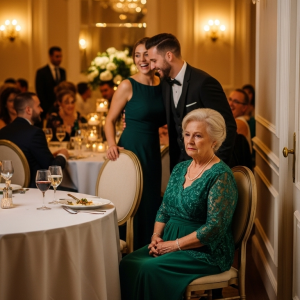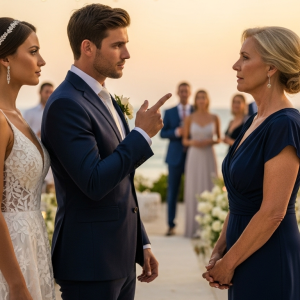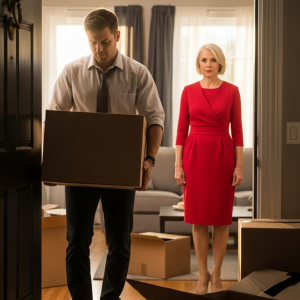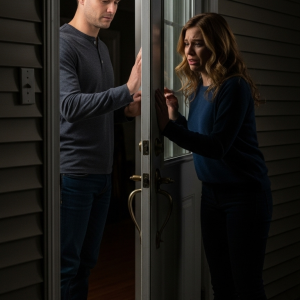The moment I walked into my parents’ house for Sunday dinner, I knew how the night would end. The air was thick with the smell of barbecued ribs and my dad’s fancy cologne, a scent that always preceded a demand. My younger sister, Lauren, was the golden child; I was the “independent” one—a polite term for the son who didn’t get handouts.
Sure enough, after a few drinks, Dad cleared his throat. “Lauren’s been doing great in college,” he announced to the room. “Top of her class. Professors say she’s got a bright future.” He then turned to me, a calculated look in his eye. “Ethan, don’t you think it’s time you helped out your sister a little?”
There it was. I glanced at Lauren, who was feigning surprise. “How do you mean?” I asked, playing dumb. “She’s been struggling to get to work and class,” Dad said, swirling his whiskey. “You’ve got a good job now. Maybe you could buy her a car.”
I almost choked on my drink. I was expecting a request for rent money, not a brand-new vehicle. Lauren gave an Oscar-worthy performance of humility. “I mean, I wasn’t going to ask, but it would make things so much easier. Just something simple, like a used Civic.” My mother jumped in. “It’s not that much to ask, sweetheart. You’re doing so well, it wouldn’t even make a dent in your finances.” I put down my fork. “I’m not buying her a car.”
The air went still. Dad’s face twitched. “Are you serious?” “Yeah,” I said calmly. “I worked my way through college without anyone buying me a car. If Lauren wants one, she can do what I did: save up.” Dad slammed his glass on the table. “Unbelievable. I don’t know where we went wrong with you. You’ve become selfish. You only think about yourself.” He pointed a trembling finger at the door. “If you’re going to act like this, you can leave.” I looked at my mom, hoping for an ally. She just stared at her plate. Lauren crossed her arms, a smirk of victory on her face. I stood up, grabbed my jacket, and walked out into the cold night air. They had made their choice. Now, it was time for me to make mine.
The next morning, nursing my frustration with a pot of coffee, I remembered the shared bank account. Years ago, back when I was naive enough to believe in unconditional family support, I had set it up to give Lauren a small financial cushion. I hadn’t looked at it in years. Curiosity gnawing at me, I opened my banking app.
It wasn’t a cushion; it was a full-blown lifestyle sponsorship. Rows and rows of charges: Starbucks, Sephora, hundreds blown on Uber Eats. Lauren hadn’t been struggling; she’d been living like a VIP on my dime. Then I saw it: a $600 charge from a boutique in L.A. I didn’t hesitate. I went into the account settings, removed my name, and transferred every last cent into my personal savings. Seconds later, my phone buzzed. It was Lauren. “What the hell, Ethan?” she shrieked. “My card just got declined!” “Yeah,” I said, my voice even. “I closed the account.” “You can’t do that! I have bills!” “Get a job that covers your lifestyle,” I said flatly, and hung up. I sat back, gripping my coffee mug. I was done being their personal bank.
The knock on my door came an hour later. It was my father, Frank, his belt tightened a little too much in that way he did when he meant business. “Lauren told me what you did,” he said, pouring himself a coffee without asking. “You really think this is how you treat family?” I leaned against the counter, arms crossed. “She spent $600 at a boutique in L.A. and you’re calling me the bad guy?” His expression flickered. He hadn’t known that detail. But he recovered quickly. “This isn’t about her spending. This is about you acting like you’re too good to help your family.” It was a masterclass in guilt-tripping, but for the first time, it didn’t work. “So here’s what’s going to happen,” he continued, shifting into his negotiation voice. “You’re going to transfer the money back, or at least cover her rent for next month.” I just shook my head. “No.” His jaw tightened. “You’re making a mistake, Ethan. One day, you’re going to need us, and when that day comes, don’t expect us to be there.” He slammed the door on his way out.
A few days later, I was scrolling through Craigslist when I saw it: my old ’08 Mustang, the car I had worked two jobs to buy as a teenager, listed for sale by my father. He hadn’t even asked. He just decided that since I wouldn’t bow to his demands, he would start selling my property.
I drove to their house, walked straight in, and grabbed the spare keys from the hook by the door. I was reversing out of the driveway before my dad even made it to the porch. My phone started buzzing. It was him. “You stole that car!” he roared. I laughed. “Stole? I took back my own property, Dad. That’s not how ownership works.” “This isn’t over,” he said, his voice a low threat. I hung up. He was right. It wasn’t over.
A couple of days later, I walked into my apartment and my stomach dropped. My gaming console, my laptop, and my watches—including the one my grandfather had given me—were gone. There was no forced entry. Someone had used a key. My father.
I called him, my voice dangerously calm. He picked up, sounding like he’d been expecting it. “Finally notice, huh?” “Where’s my stuff, Dad?” “I sold it,” he said without a hint of shame. “You don’t want to help the family, fine. Then you don’t need all that extra stuff. Someone else can make better use of it.” The sheer audacity of it left me speechless. This wasn’t a family issue anymore. This was theft. “You’re my son,” he continued, as if that explained everything. “Everything you have, we helped you get. Don’t act like you did it all on your own.” That was the final straw. “I’m done,” I said, my voice cold. “Yeah, with what?” “With you. With all of this. You want to take from me, fine. But don’t expect me to come running when you need something.” “You’ll come back around,” he scoffed. “You always do.”
I ended the call. He was wrong. This time, I wouldn’t. I did what I should have done from the start: I called a lawyer, who confirmed what I already knew. This was a crime. Then, I filed a police report.
I called my father one last time. “I filed a police report.” The silence on the other end was telling. Then, for the first time, I heard a crack in his voice. Panic. “Listen, son,” he said, his tone shifting to sickly sweet. “There’s no need to get the police involved. Let’s talk this out.” “That option was on the table before you broke into my home and sold my property.” A heavy breath. “Fine. What do you want?” “Every dollar you made from selling my things. Now.” A few minutes later, a transfer notification popped up on my phone. The threat of real, legal consequences was the only language he understood. I had won the round, but I knew the war wasn’t over.
A week later, I packed up my apartment, put in my two weeks’ notice at work, and started looking at places out of state. I landed on Colorado—far enough away that no one could just “drop by.” I didn’t tell anyone. I cancelled my lease, shut down my old phone number, and disappeared. For the first time in my adult life, I felt like I could finally breathe.
Months passed. My new life was quiet, peaceful. Then, a knock on the door of my new apartment. It was my mother. She looked smaller, drained, the usual confidence gone. “How did you find me?” I asked, blocking the doorway. “Lauren,” she said, her voice trembling. “She hired a private investigator.” I stared at her, speechless. “She’s pregnant, Ethan,” my mother continued. “And your father… he lost everything. The business, the house, it’s all gone. We need you. Please, come home.” I saw the pattern immediately. A new crisis, a new demand. “You mean you need my money,” I said. Her face crumpled. “It’s not like that.” But we both knew it was. “I spent years being the family’s financial safety net,” I said, shaking my head. “Years being what you all needed me to be. When I finally stood up for myself, you stood by and let Dad rob me.” “That was your father, not me!” “And you let it happen,” I replied, my voice flat.
She tried again, pleading about Lauren, about how scared she was, about how my father was a broken man. But the words had no power over me anymore. “That’s not my responsibility, Mom. Not now, not ever.” She finally accepted it. “I just… I had to try,” she whispered. She turned and walked away down the hallway. I closed the door, leaning against it as I let out a long, slow breath. It was really, truly over.
In the months that followed, Lauren tried to reel me back in. The texts were a masterclass in manipulation. You’re my big brother, doesn’t that mean anything? I don’t have anywhere else to turn. Some small part of me hesitated, wondering if she had changed. So, I checked her social media. There she was, posting photos from expensive restaurants and designer baby stores, all while telling her friends in the comments how her “selfish brother” had abandoned his pregnant sister. That was all the confirmation I needed. I blocked her number for good.
Six months later, I was living a life I never thought possible. I had friends who liked me for who I was, not what I could provide. I took up cooking. I went to the gym. I started dating. The constant, low-grade stress of waiting for the next family disaster was gone, and in its place was a quiet, steady peace.
Every now and then, a song or a smell would remind me of home, and I’d wonder if I’d made the right choice. Then I’d remember the feeling of being their ATM, their janitor of problems, their last resort. I’d remember my father’s cold dismissal and my sister’s entitled smirk. And I would know, without a shadow of a doubt, that I had. I wasn’t selfish. I was free.
The night stretched endlessly above us, a velvet canvas scattered with fire. Ellie’s head rested on my shoulder, her breathing steady, grounding me in a way no constellation ever could. For years I had been chasing the sky, but she reminded me that some of the brightest lights were found right here on earth.
“I used to think the stars were escape routes,” I said softly. “Like, if I could just reach far enough, I’d get away from everything that hurt.”
She smiled in that quiet way she did when she was about to drop wisdom like a comet. “Maybe they’re not escape routes. Maybe they’re guideposts. Leading you back to who you’re supposed to be.”
The desert wind carried her words into me. For the first time in a long time, I didn’t feel like I was running. I felt… anchored.
In the months that followed, life became a strange blend of surreal and ordinary. By day, I was knee-deep in grant applications for the foundation, overseeing construction on NASA’s new observatory, and balancing online classes. By night, I’d return to my telescope, capturing new images to share with the followers who had become like an extended family.
The festival had changed everything. Our tiny desert outpost was no longer a curiosity; it was a destination. Families drove hours to attend weekend star parties. High school students wrote essays about the experience of seeing Saturn’s rings with their own eyes. A few even decided to pursue astronomy degrees. That thought alone kept me going on days when exhaustion threatened to take over.
But success came with shadows. My family had accepted my loan, but trust was still fragile. I visited the farm every few weeks to check on their progress with soil restoration and crop diversification. Dad was civil, even cooperative, but I could see the unspoken pride battle every time he had to ask for advice. Travis and Mike barely looked me in the eye.
One evening, while inspecting new irrigation equipment, Mike finally snapped.
“You think you’re better than us now, don’t you?” His voice carried that bitter edge I’d known since childhood.
“No,” I said, calmly. “I just think differently. That’s always been the problem.”
He kicked at the dry soil. “Dad worships you now. But when it was just us, breaking our backs on this land, you were too busy looking at the damn stars.”
I swallowed hard. The old guilt stirred, but I forced myself to answer. “I didn’t ask for worship. I just wanted respect. For once.”
Mike didn’t reply. But the silence was heavy enough to count as a truce.
Back at the desert, a new challenge awaited me. NASA’s lease had attracted attention from private companies. One evening, a convoy of glossy black trucks arrived, carrying a tech billionaire named Carson Vail. He wore jeans and boots that looked fresh from a catalog, the kind meant to signal “one of the guys.”
“Mr. Johnson,” he greeted me with a rehearsed smile. “Or should I say, Jesse the Star Man. I’ve been following your story. Very inspiring. I’d like to buy your land. All of it.”
My gut twisted. “It’s not for sale.”
He chuckled like he was humoring a child. “Everything is for sale. I’ll triple whatever NASA’s paying. You can walk away from all this with more money than you’ll ever need.”
I thought of the RV I’d first slept in, of the telescope pulled from junk, of Ellie’s laughter under the stars. Money wasn’t the measure anymore. “This isn’t about money,” I said flatly. “This is about purpose.”
His smile faltered. “Purpose doesn’t keep the lights on, son.”
I gestured to the solar panels gleaming in the sun. “Seems to be working fine here.”
He left in frustration, but I knew it wasn’t the end. People like him didn’t take “no” easily.
The pressure grew. Rumors spread online that Nomad’s Land might be sold, that NASA’s work here was at risk. I received angry emails from followers, pleading with me not to “sell out.” Local ranchers, jealous of my windfall, accused me of ruining the “heritage” of the region. For weeks, Ellie and I debated our options. Should we go public with the rejection of Vail’s offer? Should we confront the rumors directly?
One night, as I stared at the flickering campfire outside our tiny house, Ellie put her hand on mine. “Remember what you told me—that sometimes the worst moments lead to the best outcomes? Maybe this storm is just another guidepost. You can’t hide forever, Jesse. You need to step forward.”
She was right. I called a press conference.
Standing on a makeshift stage under the blazing desert sun, I faced a crowd of reporters, ranchers, and curious locals. “Five years ago,” I began, “I was the kid who didn’t belong. I was told the only thing that mattered was the dirt under my fingernails. But I found value in different dirt—the kind that reflects the stars instead of crops.” I paused, letting the murmurs settle. “This land is not for sale. Not to billionaires, not to developers. Because it’s not just land. It’s a vision. A place where kids from nowhere towns can look up and see what’s possible.”
The applause was hesitant, then grew. Not everyone believed me. But some did. And that was enough.
Weeks later, Ellie and I visited the Johnson farm again. Dad had aged visibly, the drought carving lines into his face deeper than time alone could. But something had shifted in him. He handed me a notebook—his own, filled with sketches of irrigation systems, soil tests, and even some astronomy notes copied from my foundation’s website.
“I’ve been learning,” he admitted. “Trying to see things the way you do.”
For once, I didn’t feel the old sting of sarcasm or dismissal. I felt… hope.
“Then maybe,” I said, “we’ve both come a long way.”
The years rolled on. NASA expanded their observatory, bringing scientists and students from around the world. The foundation grew, sponsoring rural kids in Texas, Arizona, and beyond. Ellie and I married under the desert sky, our vows spoken with meteor showers streaking overhead.
One night, long after the guests had gone and the music had faded, I walked alone to the ridge above our land. I thought of that first night, seventeen and terrified, with nothing but a truck and a stubborn dream.
I whispered to the darkness, as if my younger self might still be listening:
“You did it. You held on. You found your way.”
And overhead, as if in reply, the stars burned brighter than ever.




